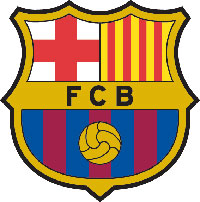|
In
Mexico, Barça was
given a warm official reception by the authorities and the
local press and entertained by the Spanish exile
community. No one in the club seemed in any great hurry to
return to Barcelona, so that a tour that in normal circumstances would have
taken two weeks went on for two months. Barça
played six matches, of which they won four. The local
newspaper El
Universal commented that there were two reasons why Barça was so popular. The first was that it played well. The second
was that the players behaved like true gentlemen. This was
a thinly-veiled tribute to their manager who had, against
the odds, helped to turn the tour into both a propaganda coup
and a financial tour-de-force.
After
Mexico, Barça moved
on to New York where they played four matches in September 1937. One was
against the local Latin community team known as Hispano;
two were against a ragtag selection of Italians, Irishmen
and other European immigrants; and the fourth was against
a team put together by the local Jewish community. More
money was paid out. However, Barça
had by now run out of places to escape to. At a closed
meeting in their New York hotel, the club secretary Calvet
offered players and staff a stark choice: they could
choose to go back to Barcelona and risk whatever the end
of the Spanish Civil War would bring or they could remain
away from the Spanish turmoil, effectively as exiles but
no longer as functioning members of the club.
Of
sixteen players, four chose to follow Calvet,
Mur, the team doctor Amoros and O’Connell back home. Of the
twelve who chose not to, a majority returned to
Mexico, and three opted for exile in France. Meanwhile, Calvet took the intelligent decision not to
take the money paid in cash for the tour back with him to Barcelona, where it would have run the risk of falling into the
hands of revolutionaries or fascists. Instead he had it
transferred to an account in Paris, to be held as security against the club’s future
needs.
Six
months later, just before midnight, Franco’s air force
bombed a building near the centre of Barcelona used by Barça officials and staff, including O’Connell, as a social club.
Because of the lateness of the hour, the building was
empty of people except for the porter who miraculously
survived with only minor cuts. Many documents also escaped
destruction. Some of the trophies that the club had won
over the years were crushed or melted in the heat, but
others still stood. If there was any symbolism to be drawn
from the incident, it was that it foretold a future where
FC Barcelona would continue to draw strength from
adversity.
On
8 January 1939 a Barça reserve team played the last football game inside territory
held by Republican Spain against a minor team called
Martinec, and won 3-1. Nine days later, a railway worker
called Soler Godayol and a farm labourer, Suarc Albesa,
signed up for membership of the club. Many more members
would sign in the years following 26 January 1939, when
Franco’s army entered the city of Barcelona.
O’Connell
had left
Barcelona
on his return from Mexico. He then returned to Spain during the Second World War and spent two further periods
managing Spanish clubs during the 1940s, first with
Sevilla, then back at Racing.
He successfully suppressed, at least in public,
whatever earlier political leanings he may have had, and
focused on helping to turn football into a massively
popular sport just as Franco wished, with a few more
victories on the pitch.
But
he never recovered the excitement or passion he
experienced in
Catalonia, and his later years were spent in relative obscurity,
living far from the public eye in run-down lodgings near
St. Pancras station, in north London.
Jimmy
Burns
Notes
[1]
Jimmy
Burns is a journalist with the Financial
Times and author of several books including Barça: A People’s Passion (Bloomsbury); When Beckham went to
Spain: Power, stardom, and Real
Madrid
(Penguin), and The
Hand of God: A Biography of Diego Maradona (Bloomsbury).
Jimmy Burns (www.jimmy-burns.com).
References
-
Artells, Joan Josep, Barça, Barça, Barça (Barcelona: Laia, 1972).
-
Burns, Jimmy,
Spain, A Literary
Companion
(Málaga: Santana Books, 2006).
-
Burns, Jimmy, Barça,
A People’s Passion (London: Bloomsbury, 1999).
-
Jackson, Gabriel, A Concise History of the Spanish Civil War (London: Thames &
Hudson, 1974).
-
Kee, Robert, The
Green Flag: A History of Irish Nationalism (London: Penguin, 2000).
-
Vázquez Montalbán, Manuel, Barcelonas (Barcelona: Empúries, 1990).
-
Orwell, George, Homage
to Catalonia (London: Penguin, 1989).
-
Sobrequés, Jaume, FC
Barcelona: Su Historia y Su Presente (Madrid:
Edilibrio, 1995).
-
Sobrequés, Jaume,
Historia del FC Barcelona
(Barcelona: Labor, 1993).
-
Thomas, Hugh, The
Spanish Civil War (London: Penguin, 1990).
|

